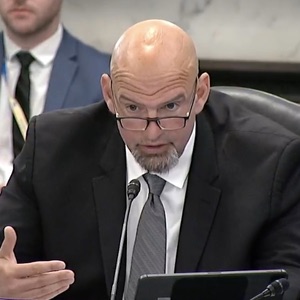Fetterman Says Magic Mushrooms Could Be ‘Economic Boom’ for PA

It’s not every day that the phrase “magic mushrooms” turns up in U.S. Senate proceedings. But leave it to Sen. John Fetterman (D-Pa.) to make it happen. Now critics say he is high on his own supply.
During a Senate agriculture subcommittee hearing last week, Fetterman spoke favorably about psilocybin mushrooms, claiming the mind-altering fungi can provide both economic and mental health benefits to growers and users. Fetterman has also long advocated the legalization of marijuana, writing on his campaign website that weed “should be legal, nationwide.”
Psychedelics aside, mushrooms are a major part of Pennsylvania’s agricultural economy. Chester County’s Kennett Square is known as the “Mushroom Capital of the World,” and the American Mushroom Institute says more than 60 percent of all mushrooms produced in the U.S. come from the region.
Reps. Chrissy Houlahan (D-Pa.) and Dan Meuser (R-Pa.) have introduced the Protecting Mushroom Farmers Act mandating a federal study on crop insurance benefits for mushroom farmers. Fetterman and fellow Democrat Sen. Bob Casey filed companion legislation in the Senate.
According to Fetterman, the mushroom industry employs nearly 9,500 Pennsylvanians and contributes an estimated $2.7 billion to the local economy. But “magic mushrooms” are not part of the mix.
“I’ve been an advocate of psychedelics in terms of the magic mushrooms for PTSDs and for veterans especially,” the senator said during the hearing. He argued psychedelics could present an “amazing economic kind of boom” for growers in the state and “a revolution in mental health.”
Witness Chris Alonzo, a Kennett Square mushroom farmer, quickly tried to steer the conversation away from mind-altering drugs, speaking more broadly on the need to “create healthy food for the community.”
Fetterman briefly persisted, claiming the U.S. “should have more research in microdosing and other issues” before ultimately dropping the issue.
The use of psilocybin mushrooms has been hotly debated among mycologists and drug regulators. The federal Drug Enforcement Administration (DEA) lists the drug as “a Schedule I substance under the Controlled Substances Act, meaning that it has a high potential for abuse, no currently accepted medical use in treatment in the United States, and a lack of accepted safety for use under medical supervision.”
DEA literature claims that persistent substance usage can lead to “longer, more intense ‘trip’ episodes, challenging experiences (physical and emotional), psychosis, and possible death.”
The Pennsylvania Department of Drug and Alcohol Programs did not comment directly on Fetterman’s remarks, though a spokeswoman pointed to the portion of the Pennsylvania code that lists psilocybin as a “controlled substance.” Like the DEA, Pennsylvania claims psilocybin has “a high potential for abuse; no currently accepted medical use in the United States; and a lack of accepted safety for use under medical supervision.”
In contrast, Michael Beug, professor emeritus at the Evergreen State College in Washington State, downplayed the alleged dangers of mushrooms.
“Psilocybin mushrooms are anti-addictive (abuse them, and you do not get hooked, they quit working),” he said. “There is no known LD-50 (lethal dose in 50 percent of the population).”
“At a ‘heroic dose’ (full-scale hallucinations), the therapeutic effects can last months to years, and in some cases, even one trip can change a person for a lifetime,” he claimed, though he added “guidance is essential” as “the trip can be terrifying and unguided trips can lead to very bad decisions while tripping.
“In addition to the original, intriguing studies in the 1960s,” he continued, “serious research resumed in the late 1990s, and now dozens of major research institutions (mainly in the U.S. and Europe) have programs underway.” He called the potential therapeutic quality of the mushrooms “absolutely a ‘revolution in mental health.’”
Not everyone agrees.
“When it comes to significant side effects, experts’ primary worry about ketamine, psilocybin, and other hallucinogens, like LSD or ayahuasca, is that they can trigger a psychotic or manic episode,” The New York Times reported.


